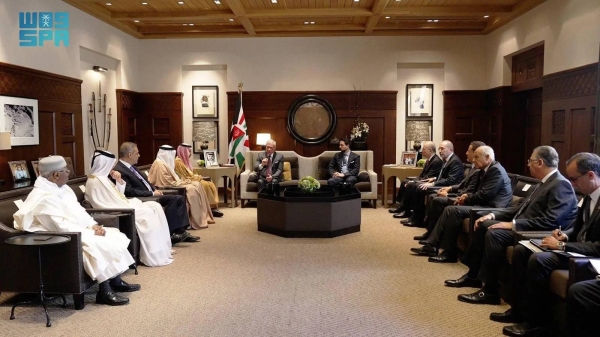King Abdullah II of Jordan recently met with the Arab-Islamic Ministerial Committee in Amman to discuss the ongoing war in Gaza and the Israeli attacks in the West Bank. The King emphasized the need for immediate and permanent ceasefire in Gaza and increased humanitarian aid for the people affected by the conflict. He highlighted the importance of the committee in advocating for international action to stop the war and work towards a just and comprehensive peace based on the two-state solution. The meeting was attended by Crown Prince Al-Hussein bin Abdullah and also included high-ranking officials from countries such as Saudi Arabia, Palestine, Bahrain, Türkiye, Qatar, Egypt, and representatives from the Arab League and the Organization of Islamic Cooperation.
The King’s warning of the repercussions of the war in Gaza and Israel’s aggression in the West Bank on the security and stability of the region underscores the seriousness of the situation. The ongoing conflict has led to a humanitarian crisis in Gaza, with thousands of people being displaced and facing shortages of essential supplies. King Abdullah’s call for an immediate ceasefire and increased relief aid reflects the urgent need to address the suffering of the Palestinian people and find a sustainable solution to the conflict. The involvement of the Arab-Islamic Ministerial Committee and its efforts to mobilize international support for ending the war demonstrates a collective commitment to peace and stability in the region.
The meeting between King Abdullah and the delegation from the Arab-Islamic Ministerial Committee is a significant step towards addressing the crisis in Gaza and promoting peace in the region. By bringing together key stakeholders from Arab and Islamic countries, the committee can leverage their collective influence to push for diplomatic solutions and humanitarian assistance. The presence of top diplomats and officials from countries such as Saudi Arabia, Bahrain, Türkiye, and Qatar underscores the regional importance of finding a resolution to the conflict that respects the rights and aspirations of the Palestinian people.
The King’s emphasis on the committee’s role in advocating for Arab and Islamic positions to the international community highlights the importance of global cooperation in resolving regional conflicts. By working together to raise awareness of the situation in Gaza and mobilize support for peace efforts, the committee can make a meaningful impact on the ground. The King’s call for a political horizon based on the two-state solution reflects a commitment to a just and lasting peace that addresses the legitimate grievances of both Palestinians and Israelis. By engaging with international partners and institutions, the committee can help to advance a sustainable peace process that respects the rights and security of all parties involved.
In conclusion, King Abdullah II’s warning of the repercussions of the war in Gaza and Israel’s aggression in the West Bank underscores the urgent need for a comprehensive and sustainable solution to the conflict. The meeting with the Arab-Islamic Ministerial Committee and the involvement of key regional stakeholders demonstrate a collective commitment to peace and stability in the region. By advocating for international action to stop the war, increase relief aid, and find a political horizon based on the two-state solution, the committee can play a crucial role in advancing peace efforts. As the crisis in Gaza continues to unfold, it is essential for the international community to support diplomatic initiatives and humanitarian assistance to alleviate the suffering of the Palestinian people and pave the way for a brighter future for all in the region.










